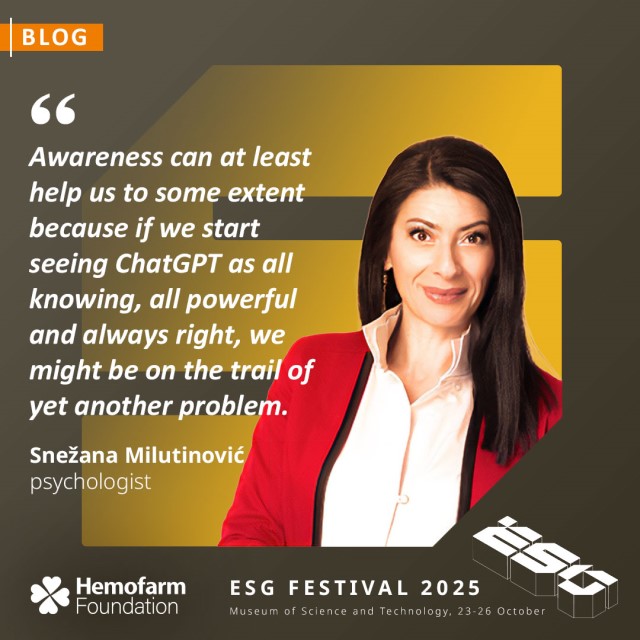
17/10/2025
ChatGPT, Psychotherapy and Mental Health
Snežana Milutinović
psychologist and Director of the Centre for Applied Psychology, Serbian Psychological Society
ChatGPT, Psychotherapy and Mental Health
It is hardly news that we constantly live through new realities. Nor is there much doubt that mental health professionals must continually develop new sensitivities to adapt to these changes. The use of AI in psychotherapy is one such reality - one that both clients and therapists must now learn to navigate. And, as with every adaptation, we are faced with many questions and challenges, most of which arise from a single fact: the person seeking psychological treatment is not communicating with another human being. What lies behind it, what happens within it, and where it leads - at this point there are more questions than answers. But one thing is certain: we must begin.
We start from a well-known fact - that clients’ initial expectations of the effectiveness and nature of psychological treatment determine both the quality and quantity of the benefits they gain from it. Even in traditional therapy, a moderate level of expectation for improvement proves to be the best predictor of therapeutic success, while expectations that are too low or too high often lead to failure. It is reasonable to assume that clients form certain expectations in relation to ChatGPT as well, and that the outcomes of such “therapy” may function in a similar way. The more we understand new technologies, the better we can adjust our expectations. Awareness can help us, at least to some extent - because if we perceive ChatGPT as all-knowing, omnipotent, and invariably right, we may already be on the verge of another problem.
The next major issue concerns confidentiality. Professionals providing psychological treatment are legally bound to complete discretion and confidentiality regarding any information shared by their clients. But what happens to confidentiality if communication is stored in virtual databases designed to improve AI services? In that case, these platforms are not truly “free,” no matter how much we like to regard that as one of their advantages.
Ultimately, the essence lies here: the therapeutic relationship consistently emerges as the main common factor in therapeutic change, contributing between 40 and 60 per cent of the overall effectiveness of psychological treatments. In short - it is the relationship that heals. This relationship includes, among other things, the exchange of non-verbal communication between therapist and client. For instance, online psychotherapy has proven to be, on average, 15 to 30 per cent less effective than therapy conducted in person, largely due to the absence of such non-verbal cues and the difficulty of maintaining direct eye contact.
Furthermore, the key components of the therapeutic relationship - the therapist’s authenticity, empathy, and unconditional acceptance of the client are, in the context of AI, at the very least questionable. At least for those of us less imaginative. Without this essence, we return to the outdated idea of simply matching a problem with a technique - a dangerous simplification of psychological treatment formally abandoned at the end of the twentieth century, in favor of the so-called person-tailored approach.
For ChatGPT to be a competent therapist, it would first need to conduct an extensive anamnesis and diagnostic interview, and then, based on the integrated data, design an individualised treatment plan for each client. At this stage of its development, that is clearly beyond its reach.
It is undeniable that in the modern era, the demand and need for psychological support far exceed its availability. In that sense, the usefulness of AI tools in providing at least some level of assistance to a broader range of potential users - especially those unable to afford professional services is unquestionable and indeed valuable. For this reason, international mental health associations advocate that AI be restricted to, or applied in, consultations with the public, subclinical populations, or those facing financial hardship.
Given the imbalance between demand and supply in this field, AI could find its appropriate role as a complement to psychotherapy rather than a substitute for it. One of the latest therapeutic schools proposing the integration of various psychotherapeutic approaches suggests a so-called contextually specific integration. This modular method enables practitioners to adapt their theoretical framework to the client’s individual characteristics and to specific situations that may arise during treatment through the application of targeted interventions grounded in empirically supported therapeutic principles. Such interventions could, in theory, be performed by a suitably programmed AI system.
Once a specific challenge is addressed using an AI-based therapeutic module, the client can return to their therapist, who continues with their original strategy. This kind of if–then supplementation of standard psychological treatment has proven highly effective in improving therapeutic outcomes.
And perhaps the greatest question that remains for the future is this: how can a platform whose chief advantage lies in ease - in providing a service without significant effort or stepping out of one’s comfort zone lead to the kind of change that psychotherapy seeks to achieve, which requires exactly that - a departure from comfort? How important is the client’s will and commitment, and how does it shape perseverance in the therapeutic process?
In the case of ChatGPT therapy, where the pace and depth of communication are entirely determined by the client, what kind and extent of personal change are truly possible in a process where we, in effect, spare ourselves?
One thing is certain - we must continue to observe and adjust to all the changes that are inevitably coming in this field.

AUTHOR
Snežana Milutinović
psychologist and Director of the Centre for Applied Psychology, Serbian Psychological Society